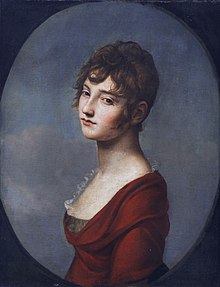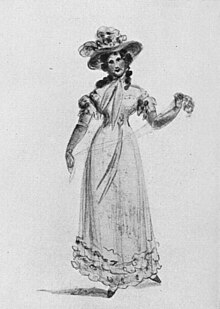Amalie Wolff-Malcolmi

Amelie Wolff-Malcolmi (born Malcolmi; born December 11, 1780 in Leipzig , † August 18, 1851 in Berlin ) was a German actress and wife of Pius Alexander Wolff .
Live and act

She was born on December 11, 1780 as the daughter of the actor Carl Friedrich Malcolmi (1745-1819) in Leipzig. At the age of eight she made her debut at the Weimar Court Theater as Justel in the "Alchemist". It must have been a success because from then on it kept appearing.
The actress at the Weimar court theater Corona Schröter taught her the art of language and representation. On December 30, 1794, at the age of eleven, she got her first permanent job at the theater in Weimar. When the talented actress Christiane Becker-Neumann (1778–1797) died unexpectedly at the age of 19 in 1797 , she took on part of her roles until she celebrated triumphant success as Solisa in Schlegel's “Alarcos” on May 29, 1802 and has since become increasingly popular first tragic heroine actress played up on the Weimar stage.
At Goethe's express request , she took on the role of Isabella on March 19, 1803 in the first performance of Friedrich Schiller's Bride of Messina . Even Schiller, who had raised concerns at the beginning, liked her performance exceptionally well. In 1803 she married the director Heinrich Becker, whose first marriage was to her colleague actor who died at an early age. Both did not harmonize at all. The marriage was unhappy and was dissolved less than a year later.
On December 26, 1804, she married Pius Alexander Wolff (1782–1828), who was only one year older and who had come to Weimar to be taught acting by Goethe, in her third marriage . It was a happy marriage from the start as both complemented each other. Pius Alexander was more the hesitant, hesitant, while Amalie was the temperamental one who sometimes had to carry him away.
"Wolff gained inner support through this marriage, it protected him from many errors and contributed to keeping his artistic pursuits pure". But she also benefited from him; when they performed together in Goethe's Tasso, she played the princess, while he played the leading role. They also played leading roles in Iphigenia on Tauris and in Romeo and Juliet and were thus able to use their full artistic power.
After an extremely successful year, a year of great inconvenience followed when French soldiers raided Weimar in 1806, plundering and abusing, and billeted themselves everywhere. When the situation generally calmed down in 1807, Weimar gave a guest performance in Leipzig , where it had a great success.
On February 24, 1810, Amalie and Pius Alexander shone as Kurt and Trude in the play of the same name by Zacharias Werner ; Goethe paid tribute with the words: “ Werner's twenty-fourth February , performed on his day, was a complete triumph of perfect representation. The horror of the subject vanished before the purity and safety of the performance; the attentive connoisseur left nothing to be desired "
In 1810 she dared to premiere Goethe's Faust with her husband as the first, which is considered unplayable. At the same time, both of them received an invitation to Berlin from the well-known actor August Wilhelm Iffland , who gave a guest performance in Weimar, which they can only accept next year. The guest performance in Berlin was disappointing. Contrary to her custom, the regulations stipulated that she was not allowed to appear on stage with her husband. She received a little more applause than her husband. Generally, however, their unnaturalness and rigidity have been lamented.
Back in Weimar, both were warmly welcomed and showered with acknowledgments. On her birthday on December 10, 1812, Goethe sent her lines of full praise. The upset broke out when her husband tried to get the position of director, which was refused to him by the theater management under Franz Kirms . There were unpleasant scenes in the middle of which an offer came from Count Brühl, who had taken over the management of the Berlin stage after the death of Iffland, which they cannot refuse. Together, her husband submits the application for dismissal to Goethe, who leaves them with a heavy heart.
In Berlin, both were still not allowed to appear on stage together. In view of her greater success at the last guest performance, she should receive considerably more money than her husband, but this was soon revised. She made her debut as Phaedra in ignorance that her predecessor Friederike Bethmann-Unzelmann had shone in this role with the Berlin audience. So the reception of their performance was disappointing for them. On the other hand, critics and audiences had to admit decisive progress to her husband. Despite all the odds, she and her husband managed to play their way into the hearts of the audience. In the Berliner Schauspielhaus she met the then young actress Karoline Bauer , who later became Countess Montgomery, and became close friends with her.
After a few years in Berlin, her husband fell ill and was absent from the stage more and more often. When he had to give temporary performances in the large opera house as a result of a fire, the room turned out to be too big for him to penetrate his voice. In the fall of 1821, an encephalitis prevented him from reading and speaking for 28 days. Numerous guest appearances outside of Berlin followed in order to maintain their joint appearances, which were also very successful. During a guest tour on April 10, 1822, they met the writer and philologist Ludwig Tieck in Dresden. They wanted to return to his offer of engagement, but King Wilhelm Friedrich III. politely but firmly declined a discharge. He willingly granted her ailing husband spa holidays in France , which ultimately had little effect. On her last spa vacation in 1828, her husband, whom she always accompanied, felt that the end was near and tried to get to Berlin, which he could no longer reach. He died on August 28, 1828 in Weimar, mourned by Goethe and many of his fellow actors.
Amalie Wolff arrived in Berlin as a widow and stayed on the stage for another sixteen years, until an eye disease made it impossible for her to perform again in 1844. Unbroken in spirit, but increasingly physically attacked, she lived another seven years and died on August 18, 1851 in Berlin. She was buried in Dreifaltigkeitskirchhof II . Her grave was dedicated to the city of Berlin from 1978 to 1999 as an honor grave .
Henriette Schramm-Graham was to be her successor in 1844 , but she refused for the sake of her family.
Quotes
"I headed the theater for 22 years without allowing myself a weakness against an actrise, several of which, especially Euphrosyne and the Wolff, made it very close to me."
literature
- Hermann Arthur Lier: Wolff, Pius Alexander . In: Allgemeine Deutsche Biographie (ADB). Volume 44, Duncker & Humblot, Leipzig 1898, pp. 45-51.
- Hans Wahl, Anton Kippenberg: Goethe and his world . Insel-Verlag, Leipzig 1932, p. 156, 273
- Karoline Bauer: From my stage life. A selection from the artist's memoirs Edited by Dr. Karl von Hollander. Gustav Kiepenheuer Verlag, Weimar 1917
- Hans G. Böhme: The Weilburger Goethe finds. Sheets from the estate of Pius Alexander Wolff . ISBN 3-7849-0914-0
- Hans-Georg Böhme, Pius Alexander Wolff: The Weilburger Goethe finds . Lechte, 1950
- Karl-Theodor von Küstner: Thirty-four years of my theater management . Printed by FA Brockhaus, Leipzig, p. 16
- Dieter Götze: The memoirs of Karoline Bauer . In: Berlin monthly magazine ( Luisenstädtischer Bildungsverein ) . Issue 7, 1998, ISSN 0944-5560 , p. 84–86 ( luise-berlin.de - Karoline Bauer's memories of Amalie and Pius Alexander Wolff).
Web links
Individual evidence
- ↑ Ludwig Eisenberg : Amalie Wolff-Malcolmi . In: Large biographical lexicon of the German stage in the XIX. Century. Paul List, Leipzig 1903, p. 634 ( daten.digitale-sammlungen.de ).
| personal data | |
|---|---|
| SURNAME | Wolff-Malcolmi, Amalie |
| ALTERNATIVE NAMES | Wolff, Amalie; Malcolmi, Anna Amalie (maiden name) |
| BRIEF DESCRIPTION | German actress and wife Pius Alexander Wolffs |
| DATE OF BIRTH | December 11, 1780 |
| PLACE OF BIRTH | Leipzig |
| DATE OF DEATH | August 18, 1851 |
| Place of death | Berlin |

